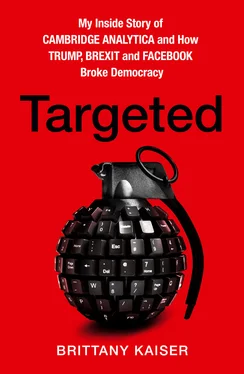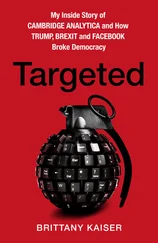I stood at the door and welcomed guests. Each was more famous than the last: the entrepreneur Richard Branson, Ross Perot Sr. and Jr., members of the Dutch royal family, and at least a hundred others. They spilled out onto the terrace, where they watched the bartenders performing magic tricks, mixing cocktails and juggling with fire. Inside, in the middle of the living room, they stood around watching a giant demonstration that the aspiring asteroid miners had set up: a model of an asteroid atop of which was perched a contraption that looked like a tripod and was meant to resemble something like an oil rig.
Milling among the guests, John Jones looked happy. While Alexander clearly felt that SCL was in a far smaller class than the other businesses represented in the room, he was glad to have the chance to network, and he was particularly happy to see Eric Schmidt, the CEO of Google. Before he ventured over to Schmidt, he shared with me that it was Sophie Schmidt, Eric’s daughter, who had been partly responsible for inspiring the inception of Cambridge Analytica.
The party was going swimmingly until my phone buzzed: the Nigerians had arrived and were downstairs, just outside the apartment building.
We had planned a literally flashy welcome for them. When they landed at Zurich airport, a limo was waiting for them, and on the drive into town, they were accompanied, in front of the limo and behind, by police cars, sirens blaring and lights flashing, announcing the arrival of visitors of significance.
But when the Nigerians reached me by phone, they weren’t pleased.
They were hungry. Where was their dinner?
I had invited them to the party; there was plenty of food there, I told them. Chester and I had spent hundreds of dollars of our budget on it.
No, they said; they were tired. They wanted to eat, be shown their lodgings, and go to bed. They weren’t interested in coming to a party. They had not eaten on the plane—a twelve-hour flight—and they wanted, they said, fried chicken. I would need to find it somewhere and bring it to them.
I had no choice but to throw on my boots and coat and head down to meet them on the icy streets below. They were standing outside the apartment building, where people were still lining up to get into my party. All five men again claimed they couldn’t possibly go upstairs and were demanding to be fed, chicken preferably.
I explained that we wouldn’t be able to drive anywhere to get it—the limo wasn’t allowed in the central area. Walking was the only choice, so I led them through the streets in the bitter cold.
They weren’t prepared for the weather. They had neither boots nor coats. They wore thin collared shirts and flat loafers. We slipped and slid, walking from closed restaurant to closed restaurant, finding, of course, no fried chicken in a Swiss mountain town, and little else as well. Finally, I happened upon a restaurant that served pasta atop of which the chef agreed to put some grilled chicken. Takeout containers in hand, I led the Nigerians back onto the slippery streets again, the men, freezing, following along behind me, barely able to stay upright. I carried the stack of chicken-and-pasta meals all the way to their lodgings, where I made sure they were settled in, and I said my good-nights. They looked cold, hungry, and far more unhappy with me than I would have liked.
I was away from the party for almost two hours. When I got back, it was 2:00 a.m., and the party was still raging.
Chester was nowhere to be found. No one had been at the door to welcome guests. No one had been in charge. The bartenders had run out of alcohol. The food had been devoured. Just before I returned, the guests had become rowdy, and a drunken princess had fallen outside and, though unhurt, was making an inebriated ruckus that had set off alarms.
For the second time that night, the air filled with the sound of sirens and the flash of spinning lights. The Swiss Police were on their way to stop the party. With the help of the son of the head of police, we managed to talk them out of arresting anyone, but not in stopping the party.
When the interaction was over, I stood in the middle of the empty room. I was starving. Like the Nigerians, I hadn’t eaten for hours.
Alexander was as pleased withthe results of Davos as he was of the deal I had made with the Nigerians. He had found the party festive. He had met people he wouldn’t otherwise have, and of course SCL had walked away with a giant fishbowl full of business cards from some of the wealthiest and most influential people in the world.
What he didn’t know yet was how disastrous the evening had been for our relationship with our Nigerian clients, and how angry they were the next morning when they woke to discover that Alexander had flown back to London without even bothering to meet them.
When they learned that he was gone, they demanded that I come to see them immediately. They didn’t want to go out themselves. It was too cold.
So, I made my way through the slippery streets in my inadequate boots, cringing.
I’d never been yelled at by an African billionaire before. He and the other Nigerians didn’t understand why they weren’t being treated better. They were VIPs, they said, just as important as the other VIPs at the conference. Why had no reception been arranged especially for them? Why hadn’t the CEO of my company, to which they had just paid nearly $2 million, stayed to meet them? They were unhappy, too, with the work we were doing in Nigeria. Where were the radio spots? Where were all the billboards? What’s our money going toward? they demanded to know.
I didn’t know how to reason with them. They had never invested in an election before. They didn’t know what to expect. Perhaps they had thought they would see a giant rally on the back of a truck with LED screens flashing and megaphones blasting. That hadn’t been part of the team’s plan. Measuring the impact of elections work is a complicated task, and, having been a part of the company for just over a month, I couldn’t explain to them right then and there why everything SCL had done wasn’t more obvious to the naked eye. The fruits of SCL’s labors might be borne out only on Election Day in March, and they needed to be patient.
But they wouldn’t listen to me. It wasn’t just that I was young; it was also that I was a woman. This attitude was eminently clear, and made me incredibly uncomfortable. It even began to feel threatening. These were powerful, wealthy men, the kind who thought nothing of filling a jet with naira, the Nigerian currency. What might they be capable of if they were unhappy with how that money had been spent?
When I put them on a conference call with Alexander, they were calmer, and much more respectful. They didn’t yell, but they weren’t assuaged. Yet Alexander seemed oblivious to how serious the situation was.
I arranged for John Jones to come over and visit with them. Perhaps they could find a way of working together. We discussed strategies for showing up Buhari in the press and making his alleged war crimes known, but when I left the Nigerians with him to head back to our apartment, I had the sinking feeling that there would be no second contract after February 14. The Nigerians hadn’t said as much, but the way they’d treated me was demeaning. How could I possibly return to them and close another contract? Things were trending in a bad direction, and even worse, while taking care of them, I’d had no time even to pursue any SCL leads, so the trip would not even result in new business.
As if all that weren’t bad enough, that morning the website Business Insider published a story about the evening before: “Davos Party Shut Down After Bartenders Blow Through Enough Booze for Two Nights,” the headline read. 8
Читать дальше












